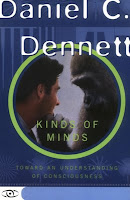Publisher: Orion Publishing Group | ISBN: 0752839896 | MP3 | 32kbps | 3:30:40 | 48.2 MB
In Consciousness Explained, Daniel Dennett embarks on the audacious task of explaining human consciousness. He sets his sights even higher for Kinds of Minds, attempting to provide a more general explanation of consciousness. But don't be put off: the book is short, easy to read, and makes a good introduction to Dennett's richly interdisciplinary oeuvre. While beginners will appreciate Dennett's appeals to intuitive moral considerations to emphasize the importance of investigating consciousness, there is much in the book to hold the attention of readers already familiar with his previous work.
At the beginning of Kinds of Minds Dennett asks, "What kinds of minds are there? And how do we know?" These two questions--the first ontological, the second epistemological--set the agenda for the book. Intuitions untutored by theory are not capable of answering these questions, Dennett argues, making it necessary to pursue insight from the evolutionary point of view. Accordingly, subsequent chapters are devoted to phylogenetic speculations about agency and intentionality, sensitivity and sentience, and perception and behavior. Particularly charming is the series of squiggly amoebas--the Darwinian, Skinnerian, Popperian, and Gregorian creatures--that illustrates the hierarchy of cognitive power. In the final chapter, Dennett returns to the original two questions, ending not with their answers, but, he hopes, with "better versions of the questions themselves." -- Amazon
Dennett (Darwin's Dangerous Idea), director of the Center for Cognitive Studies at Tufts University, avers that language is the "slingshot" that has "launched [humans] far beyond all other earthly species in the power to look ahead and reflect." In this brief study, some of which is drawn from notes for the author's various lectures, and which returns him to some of the themes of his controversial bestseller, Consciousness Explained (1991), he explores how the human mind came into existence. Along the way, he investigates such questions as, How does the mind work? Can we know another's mind? Can a woman know what it's like to be a man (and vice versa)? What are nonhuman minds like? Could a robot ever be "conscious"? Philosopher that he is, Dennett continually raises and refines his questions about these and other subjects, attempting to tease us closer to understanding. By the end of the book, he confesses, he has not so much presented answers as found better questions to ask. Though some readers may be put off by Dennett's cocksure tone, others will be rewarded by his witty, intelligible speculation.
Copyright 1996 Reed Business Information, Inc. -- Publishers Weekly






Publicar un comentario